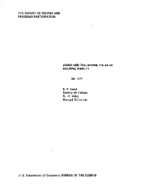Aging and the Income Value of Housing Wealth
Aging and the Income Value of Housing Wealth
The vast majority of the personal saving of most Americans is in the form of housing equity. Indeed most reach retirement age with very little liquid wealth, like bank saving accounts. One might expect therefore that housing wealth would be used to finance consumption as the elderly age. In fact reverse annuity mortgages have been proposed to facilitate drawing down of housing wealth while at the same time allowing families to continue living in their homes. Yet recent studies have shown that at least through age 73 housing wealth is typically not reduced as persons age. We concluded in earlier work (Venti and Wise [1989b, 1989a]) that the retention of housing equity was not simply the result of transaction costs associated with moving. Housing equity increases with appreciation in home values as long as a family remains in the same home, but even the elderly who move from one home to another are as likely to increase as to decrease housing equity. Thus we also concluded that even if reverse annuity mortgages were readily available the demand for them would be very limited. The implication was that the typical elderly family did not want to reduce housing equity to finance other consumption.
Others in Series
Working Paper
Working Paper
Working Paper




